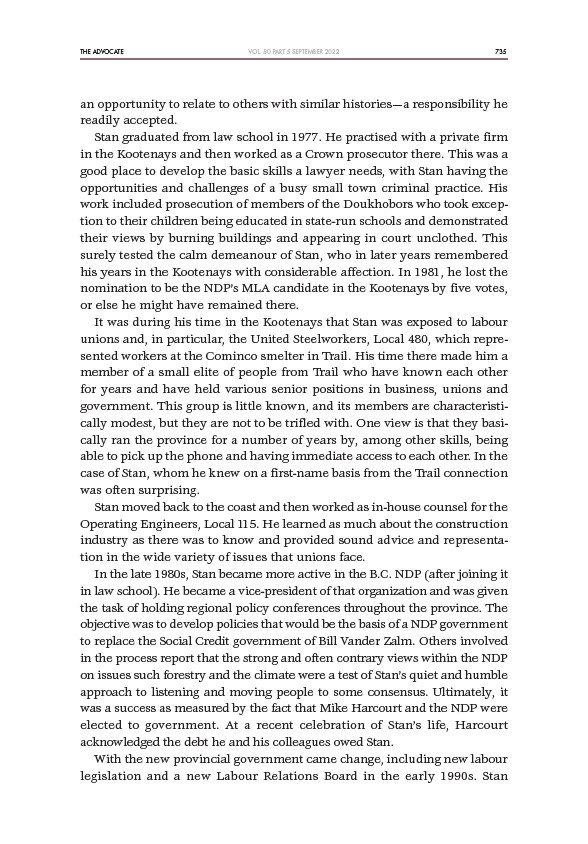
THE ADVOCATE 735
VOL. 80 PART 5 SEPTEMBER 2022
an opportunity to relate to others with similar histories—a responsibility he
readily accepted.
Stan graduated from law school in 1977. He practised with a private firm
in the Kootenays and then worked as a Crown prosecutor there. This was a
good place to develop the basic skills a lawyer needs, with Stan having the
opportunities and challenges of a busy small town criminal practice. His
work included prosecution of members of the Doukhobors who took exception
to their children being educated in state-run schools and demonstrated
their views by burning buildings and appearing in court unclothed. This
surely tested the calm demeanour of Stan, who in later years remembered
his years in the Kootenays with considerable affection. In 1981, he lost the
nomination to be the NDP’s MLA candidate in the Kootenays by five votes,
or else he might have remained there.
It was during his time in the Kootenays that Stan was exposed to labour
unions and, in particular, the United Steelworkers, Local 480, which represented
workers at the Cominco smelter in Trail. His time there made him a
member of a small elite of people from Trail who have known each other
for years and have held various senior positions in business, unions and
government. This group is little known, and its members are characteristically
modest, but they are not to be trifled with. One view is that they basically
ran the province for a number of years by, among other skills, being
able to pick up the phone and having immediate access to each other. In the
case of Stan, whom he knew on a first-name basis from the Trail connection
was often surprising.
Stan moved back to the coast and then worked as in-house counsel for the
Operating Engineers, Local 115. He learned as much about the construction
industry as there was to know and provided sound advice and representation
in the wide variety of issues that unions face.
In the late 1980s, Stan became more active in the B.C. NDP (after joining it
in law school). He became a vice-president of that organization and was given
the task of holding regional policy conferences throughout the province. The
objective was to develop policies that would be the basis of a NDP government
to replace the Social Credit government of Bill Vander Zalm. Others involved
in the process report that the strong and often contrary views within the NDP
on issues such forestry and the climate were a test of Stan’s quiet and humble
approach to listening and moving people to some consensus. Ultimately, it
was a success as measured by the fact that Mike Harcourt and the NDP were
elected to government. At a recent celebration of Stan’s life, Harcourt
acknowledged the debt he and his colleagues owed Stan.
With the new provincial government came change, including new labour
legislation and a new Labour Relations Board in the early 1990s. Stan